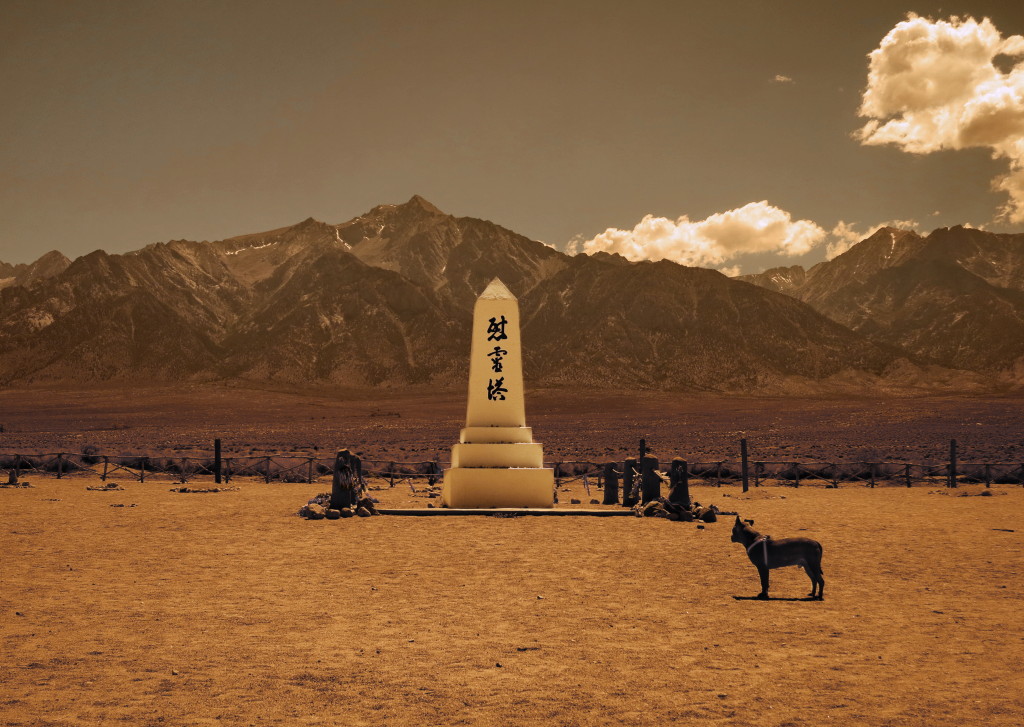ALL YOUR SWEET BABES
Before Gila River, the Araki-Morri family lived just outside Santa Maria on a property near where West Main Street turned from a paved thoroughfare into unending strawberry fields. The intersection of Blosser Road and West Main was called the Corner of Crying Dogs by locals, because owners who would no longer keep their pets for any reason—acquiring an allergy to their coat, a baby on the way, migration at the end of a picking season—found it a convenient spot to abandon them. It was a common sight when passing to find dogs from multiple owners tied to the final street sign. If they were of an anxious or aggressive nature, the sand would be marked with blood and bottle flies.
If a pup was merely left on the road and not tied to a street sign, then usually she or he wandered into the yard of the Araki-Morris. Kane Araki, Margaret Morri, and the three adolescent Araki-Morri daughters doled out bowls of table scraps and hotdog meat, de-flead, scrubbed, stitched wounds, and showed inexhaustible love for the succession of unwanted pets. That number usually hovered at around eight dogs. It was a good number with plenty of benefit to the Araki-Morris. The populations of voles, brown rats, and pocket gophers were kept to a minimum. Raccoons and possums did not rattle their metal trash bins in the night. And as a pack they were impenetrable, even for the most fearsome intruders. Twice the Araki-Morris discovered their dogs at the edge of their strawberry fields feasting upon the carcasses of slain mountain lions.
Because the dogs came to the girls without collars, they were bestowed one of two names. No matter their age or sex, they became either Ouji or Ojiichan, the first meaning prince and the second meaning grandpa. If the girls had been able to keep them all, it would’ve meant dozens of Ouji, of Ojiichan, dozens of fur coats rippling like countershaded lightning through the rear orchard and around the rows of squash, heads of lettuce, artichokes, pumpkins, flowers. But every dog had their time when they would make their break and attempt to walk the twelve miles into town, back to their original owner. The Araki-Morris rarely recovered any dogs after that. They imagined they were run down by cars. Or were overtaken by coyotes. Or they would image the familiar, sickening crack of a neighbor’s rifle.
When 9066 called for Kane and Margaret to board their windows and pack a suitcase each in preparation for evacuation, the girls worked diligently to place their eight Ouji and Ojiichan with schoolmates. These were children of white, Mexican, and Filipino families who were assured by the promise that the Araki-Morris would reclaim the dogs the moment they were allowed back in California.
And then, on the April morning before relocation, the family awoke to discover no fewer than a hundred dogs rambling through their property as though in a daze.
The family recognized a number of them. Some were the dogs of friends and relatives. Though all of them were without collars, they approached excitedly, affectionately, to the sound of their names being called.
Pete Yamamoto, Kane’s former schoolmate and Santa Maria’s dogcatcher, was sent for. But when he arrived at the Araki-Morri farm, he was out of uniform and explained that he had been forced to turn his job over to someone else. Even his own mutts he’d had to surrender to his landlord.
We have to think of a way to bring them with us, the girls said to Pete Yamamoto. Don’t you think every family will want one? They will want something to make them feel like they’re back at home.
If families thought they could manage to relocate with their pets, then we’d see more of them try, Pete Yamamoto said. You have them here because of desperation. Plus, I don’t see how soldiers are going to let one family board a train with a hundred dogs.
We’ll disguise them, the girls said. We’ll swaddle them in blankets. They’ll look just like newborns.
And who will carry in all your sweet babes? Pete Yamamoto asked.
We’ll split them up between us. We’re strong. We can punch air holes in our luggage and pack them in place of our clothes.
And what clothes will you wear in Tulare? In Gila River?
We’ll wear our extra outfits in layers, the girls said.
And you’ll faint from heat exhaustion, Pete Yamamoto said. Dressed in layers of winter coats and carrying around thirty dogs apiece.
They can follow us alongside the train, the girls said. We’ll buy twenty or thirty pounds of weenies and chop them up. We’ll tie some to sticks and lure them to the station. Once the train begins moving we’ll start dropping chopped weenies from the windows every few seconds.
It all sounds very clever, Pete Yamamoto said. Very Hansel and Gretel. And what will happen to these pooches if birds swoop down and take up their trail of hotdogs?
They can follow the tracks. The vibrations. Their ears are more sensitive than ours. We’ll teach them a song. And we’ll sing it the entire trip.
It’s more than a hundred and fifty miles to Tulare. The older dogs here won’t make it. Even if you manage to gather them all, who will feed them?
Soldiers in Tulare will want dogs. Especially soldiers away from home for the first time. They’ll keep them from getting lonely. A soldier can find a way to feed a dog.
It’s a compassionate plan, Pete Yamamoto said. But it might be foolish to rely on military police to respond kindly to requests like these.
The Araki-Morri daughters looked on despondently. A kind of Border Collie mongrel appeared beneath their hands, entreating them. They ran their tiny fingers through his coat and called him Ouji.
Let’s not get ourselves down, Pete Yamamoto said. There’s something we can do while we think of a better solution. We’ll nail signs all over town and in Guadalupe. I’ll put some calls in to our friends in Arroyo Grande and Santa Barbara and Oxnard. The signs will ask for families to come and collect any dog they like. Whatever dogs are left the pound will have to take in. I don’t like their chances there. But with luck, the people here will rally to help them.
The entire day was spent posting dozens of handwritten signs in pharmacies, schools, mortuaries, feed stores, theaters, butcher shops, department stores, bars, and diners. The signs gave a brief explanation of the hundred-dog situation and listed the Araki-Morris address. At the bottom of the signs it also read, With thanks, pick all the avocadoes, asparagus, artichokes, snow peas, and sugar snaps you can carry away. A couple of column inches were purchased in the Santa Maria Times to run the same information over the following days.
All day, the girls suggested other solutions. The dogs could be taken up by the Marine Corps to become war dogs for the Pacific. The dogs could be shipped to the Midwest to be used for herding livestock. The dogs could be sent to Nashville, Tennessee, to be trained as guide dogs. The dogs could be delivered to every firehouse and junkyard in California. In the late afternoon the girls set up a tent in the orchard surrounded by the heat of dozens of dozing canines. The girls slept with no vision for the following days.
On the morning the Araki-Morris left, the hundred deserted dogs were still there. Black Labradors, Retrievers, cattle dogs, pit bulls, spaniels, Border Collies and other sheepdogs, German Shepherds, terriers, Huskies, Whippets, Rottweilers, all drifting silently through the property in a stupor. The girls wandered beside them, attempting to sneak them slices of white bread they’d hid in their dress pockets. Before a commotion could be had, Margaret and Kane stopped them.
They’re so hungry, the girls said.
We don’t have enough to feed them all, Margaret said. They’ll begin to fight if you feed only a few of them.
There’s something strange about the dogs who came here, the girls said. They’re like ghosts. What do you think they’re waiting here for? Why do you think they haven’t tried to walk back into town?
The image of those animals would be the way the Araki-Morri family remembered their home during their years of relocation, first to the Tulare Assembly Center, and then to Butte Camp in Gila River. In 1946 the Araki-Morris returned to Santa Maria to find their home ransacked. The storage shed that’d held much of their furniture and clothing had been burned to the ground. In their orchard and in the cut rows overtaken by foxtail and sow thistle and white clover were also the desiccated bodies of dozens of dogs. At the end of the year, the city issued an invoice to the Araki-Morris for seven dollars and sixteen cents. It was the price of the ammunition that had been used to shoot them down.
///
THE SEASON OF HAIR
At the age of ninety-two, Margaret Morri, who lived in a barrack on the periphery of Canal Camp, was said to have grown the longest, thickest, most supple, and most lustrous head of hair to ever fall upon the alluvial fans and flood plains of Gila’s desert. Before relocation it was rumor that if Margaret took a swim along the California coastline, it would mean three or four days, and the assistance of three or four family members, to remove all the sea grass, moon jellies, and blue mussels tangled up in her astounding mane.
For seventy years it had been a ritual of Kane Araki’s, Margaret’s second husband, to spend his after-dinner hours combing a portion of his wife’s hair. Kane’s instrument was an immense comb with spines of apple-juice Bakelite, or sometimes Margaret’s hair would overflow and be gathered between his fingers, often until he was carried into dreaming, sitting in a chair at their bedside. This practice, held alongside those unbreakable tresses, lasted from Kumamoto, through California, and ended in Canal Camp where Kane fell asleep that final evening at the age of ninety. It was told the cycle of time necessary for Kane to finish combing the knots from Margaret’s hair in its entirety, only to begin anew at the crown of her head, took two years. On the midwinter evening of Kane’s passing, he’d been precisely halfway complete, his favorite season of hair, since much had to be pulled into his lap and over his belly like a heavy blanket.
Understanding she was going blind, Margaret spirited away a knife from one of Canal’s kitchens, and after taking three days to sharpen it upon a whetstone, she pulled her hair taut at the base of her scalp and severed ninety-two years’ worth of hair. The strands, so lusty and thick, produced a bewildering sound when they snapped, like a pedal harp raised and shattered against a bed of rocks. Then Margaret knotted her hair around the leg of their bed, staggered, and pulled its astonishing weight through the doorway, covering the path through WRA buildings, past the mess hall, spilling past the canteen, maneuvering around the military police post, until she reached Kane’s burial stone where she wound all that remained around its base. Immediately following its separation from her body, Margaret’s hair became knotted, its light dulled. The strands, though, only seemed to intensify in strength.
It has always been this way with our women, Margaret told her daughters, Kazue and Shizue. When these eyes fail, you must prepare your second set of eyes.
Grasping this cord of hair was the method Margaret found to journey from her barrack to the Canal Camp cemetery for over two years.




